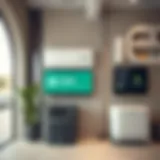Exploring the Fanus Program: Support for Dubai Citizens


Intro
In the bustling heart of Dubai, the Fanus program stands as a beacon of hope and support for its citizens. This initiative is designed not just to assist, but to empower individuals and families navigating their everyday challenges. With the backdrop of a rapidly developing metropolis, understanding the ins and outs of this program is crucial for anyone interested in the intricate web of support that exists in this vibrant city.
The Fanus program encompasses a multitude of facets tailored to the diverse needs of residents. Whether it’s financial aid, access to community resources, or guidance through various bureaucratic processes, the initiative serves as a lifeline for many. However, like any well-intentioned program, it grapples with its own set of challenges that can hinder its effectiveness.
This article will take a close look at the structure of the Fanus program, illuminating its benefits while also addressing the hurdles it faces. We aim to provide a comprehensive analysis that will serve as a practical guide for potential beneficiaries. By dissecting eligibility criteria, application protocols, and the involvement of key stakeholders, we aim to equip readers with the knowledge they need to successfully engage with this initiative.
As we delve deeper, we'll also touch upon the broader implications of the Fanus program within the local community, shedding light on how it plays a vital role in fostering a more supportive environment for all Dubai residents. So, grab a cup of coffee, settle into your chair, and let’s embark on this informative journey together. The insights you’re about to gain could very well transform your understanding of support systems available right in your neighborhood.
Preamble to the Fanus Program
The Fanus Program stands as a significant initiative targeted at uplifting citizens in Dubai. With its roots deeply embedded in the cultural fabric of the community, this program serves as a beacon of support for those navigating financial and social challenges. Understanding the Fanus Program is crucial for stakeholders, including investors, homebuyers, agents, and developers, as it plays a pivotal role in enhancing the overall quality of life in the region.
Objective of the Program
The core aim of the Fanus Program is to offer support to citizens facing economic hardship. Whether it's providing direct financial assistance or facilitating access to essential services, the program seeks to create a safety net for vulnerable populations. By addressing basic needs such as housing, healthcare, and education, the Fanus Program not only alleviates immediate stressors but also promotes long-term stability and self-sufficiency among beneficiaries.
Another important element is fostering community cohesion. By integrating various social programs under its umbrella, the Fanus Program encourages local participation and reinforces a sense of belonging. This collaborative approach helps build stronger relationships among citizens and sets the stage for collective growth and resilience.
Historical Context
The inception of the Fanus Program can be traced back to a growing recognition of economic disparities within Dubai's flourishing landscape. As the city transformed into a global powerhouse, there emerged a stark contrast in the quality of life for different segments of the population. The government, keen on maintaining social harmony, initiated the Fanus Program as a response to these challenges in the early stages of the economic boom.
Through the years, the program has undergone several phases of development, adapting to the ever-changing socio-economic environment. During economic downturns, such as the global financial crisis, the Fanus Program demonstrated its versatility by rapidly adjusting its framework to meet heightened needs. This historical adaptability has provided valuable lessons for its current operational strategies and continues to shape its future.
"Understanding the origins of the Fanus Program allows us to appreciate its ongoing impact and the commitment to supporting citizens amid adversity."
In summary, the Fanus Program is more than just an assistance initiative; it embodies the spirit of united growth and resilience in Dubai's diverse community. As we venture further into the various aspects of this program, it becomes clear that its contributions go beyond mere financial aid—encompassing social and structural support that resonates through the very heart of the city.
For more information about the social programs in Dubai, you can visit Dubai Government's official portal. To explore historical insights into the economic changes in Dubai, visit Britannica.
Target Beneficiaries
Understanding the target beneficiaries of the Fanus Program is crucial as it shapes not only the program’s efficiency but also the direct impact it has on society. Every initiative carries the weight of responsibility, and identifying who stands to gain enables stakeholders to tailor assistance, ultimately creating a more effective support system. The profiles of prospective beneficiaries reveal the diverse needs of the community, which can shift the program from mere financial support to a catalyst for sustainable development.
This section digs into the specific elements and benefits tied to those who can actually apply for aid, along with demographic insights that guide how the program is received and utilized.
Who Can Apply?
The eligibility for the Fanus Program is explicitly defined, ensuring that aid reaches those who most need it. Typically, applicants fall under specific categories that might include individuals facing economic hardships, low-income families, or those supporting dependents such as elderly parents or children. However, there’s more under the hood.
Generally, to qualify, a potential beneficiary must meet the following criteria:
- Residency: Must be a legal resident of Dubai.
- Income Threshold: Must demonstrate financial need, usually determined by household income snapshots.
- Application Documentation: Applicants are usually required to provide proof of income, residency, and identification to support their claims.
As outlined, the application process aims to streamline assistance. Yet, the precise requirements can fluctuate in accordance with changing social dynamics and government policies. For those looking to dive deeper into who can apply, it’s essential to keep up with announcements from relevant governing bodies, such as the Dubai government.
Demographics of Beneficiaries
When we talk about demographics, we’re not just crunching numbers; we’re painting a picture of the individuals behind those statistics. The Fanus Program typically serves a wide array of people which includes, but is not limited to, the following groups:
- Single Parents: Often juggling multiple responsibilities, these individuals require significant support for both emotional and financial factoring.
- Expatriates: A considerable portion of Dubai’s population, these individuals may face unique challenges in terms of employment and social safety nets.
- Senior Citizens: Aging populations in need of assistance due to limited income post-retirement add another layer of complexity.
In understanding the profiles of beneficiaries, it’s pivotal to recognize that local culture, economic conditions, and regional challenges play a significant role. Indeed, these demographics shift over time, requiring constant assessment to ensure continued relevance of the program. By examining these trends, stakeholders can not only refine strategies but also elevate the program’s overall effectiveness.
"The way we understand and adapt to our beneficiaries' diverse needs defines the success of the program and its impact on the community at large."
To conclude, a nuanced grasp of the target beneficiaries enriches the analysis of the Fanus Program. It's not simply about figuring out the numbers but rather understanding the lives behind those numbers to create a more inclusive and effective support initiative.


How the Fanus Program Works
Understanding how the Fanus Program operates is key to grasping its role in supporting citizens of Dubai. This section highlights the operational framework that guides the delivery of assistance through the program, breaking down the processes to ensure a comprehensive grasp of its mechanisms.
Application Process
To get the ball rolling, interested individuals must first navigate the application process of the Fanus Program. This process, while user-friendly, requires close attention to detail. The application can typically be completed online through an accessible portal designed to streamline submissions and minimize barriers.
- Online Submission: Start by visiting the official Fanus Program website, where you will find an easy-to-follow application form. It's built to collect essential information such as personal details and financial background.
- Required Documentation: Prepare necessary documents, such as identification and proof of residency, and ensure they are uploaded accurately. An incomplete submission can lead to delays.
- Review Stage: After submission, your application will undergo a preliminary review by the program’s administrators, ensuring all aspects are covered
- Submission Confirmation: Finally, applicants receive a confirmation of their submission, along with a timeframe for the review process, keeping everything above board.
Assessment Criteria
Once applications are submitted, they go through a rigorous assessment process. This process serves as a filter to identify eligible candidates based on various criteria, ensuring that help reaches the most deserving individuals.
Key assessment metrics include:
- Financial Need: Applicants must demonstrate genuine financial need, supported by their documents.
- Eligibility Requirements: Compliance with specific eligibility requirements is essential, such as residency status and income level. These criteria can shift to adapt to changing economic conditions.
- Community Engagement: A commitment to community service may also be factored in, highlighting a holistic approach to enhancing lives beyond mere financial assistance. This factor underscores the program's belief that support should also inspire social responsibility.
Approval and Disbursement
Once assessments are complete and the right candidates are identified, the next step involves approval and disbursement, where funds or resources are allocated. This phase is crucial, as it marks the transition from application to actionable support.
- Notification of Approval: Successful applicants receive a formal notification about their approval. This can be via email or direct contact, often outlining next steps and the expected timeline for the disbursement of funds.
- Fund Allocation: Disbursement of funds takes a structured approach to ensure transparency. The approved assistance is usually transferred directly to the beneficiary's designated account or through designated channels, tailored to suit individual requirements.
- Monitoring and Follow-Up: After disbursement, the program keeps a close eye on how the assistance is being utilized. This monitoring helps to gauge the program's effectiveness and make necessary adjustments in future distributions.
"By implementing a detailed application process and robust assessment criteria, the Fanus Program showcases its commitment to providing genuine support to its beneficiaries."
The operations of the Fanus Program not only lay the framework for accessing aid but also reflect a structured approach to uplift the community while making responsible use of funds.
Benefits of the Program
The Fanus Program serves more than just the purpose of providing support; it creates a significant lifeline for many individuals and families in Dubai. Understanding the benefits of the program is crucial, as it showcases the multifaceted approach taken to bolster community welfare and economic resilience.
Financial Assistance
The financial assistance aspect of Fanus is perhaps its most tangible benefit. This program offers a helping hand to those who might be grappling with financial difficulties. For instance, consider a single parent who needs help managing household expenses after losing a job. With the support from Fanus, they can receive necessary funds to cover food, housing, and health care costs, thereby easing their stress.
Not only does this aid alleviate immediate monetary burdens, but it also empowers individuals to focus on job hunting or enhancing their skill sets without the looming pressure of daily expenses. Moreover, these funds are structured to ensure that they reach those who are most in need—crucial during challenging economic times.
Social Impact
The social ramifications of the Fanus Program are profound. Beyond mere financial assistance, the program promotes social welfare and community cohesion. By improving the living conditions for the disadvantaged, it facilitates a sense of belonging. For instance, when families can afford basic necessities, there's a noticeable uplift in morale and overall community spirit.
This positive change ripples outward. Better living conditions lead to improved health outcomes and educational opportunities—elements that enhance future prospects for the next generation. The program fosters a culture of support rather than isolation, encouraging individuals to participate in community activities and engage with one another.
"The true strength of any community lies in its ability to uplift its vulnerable members."
Boosting Local Economies
The Fanus Program's financial assistance doesn't just stop at individuals and families; it also contributes to stimulating local economies. When recipients of the aid spend it on local goods and services, this creates a cycle of economic stimulation.
- Increased Local Spending: Families receiving aid are likely to spend it on local groceries, healthcare, and education, thereby supporting small businesses.
- Job Creation: As local businesses thrive with increased consumer spending, there's an opportunity for job creation, which in turn fosters greater stability in the community.
- Community Development: The positive economic impact catalyzes further investment in community projects, creating an environment where more people feel they can invest in their future.
With such intricately connected benefits, the Fanus Program represents not just a safety net, but a comprehensive approach to building resilient communities in Dubai.
Challenges Facing the Fanus Program
The Fanus program serves as a pivotal resource for the citizens of Dubai, yet like all initiatives, it faces various hurdles that can impede its overall effectiveness. Understanding these challenges is crucial not only for stakeholders involved in the program but also to educate potential beneficiaries on what to expect. Addressing the existing problems is vital for optimizing the delivery of support services to the community. The following sections will outline the primary challenges: access and awareness, administrative hurdles, and sustainability concerns.
Access and Awareness Issues


Access and awareness issues are perhaps the most immediate challenges confronting the Fanus Program. Many potential beneficiaries may not even know about the program’s existence or the extent of the support available. Informing citizens about the program is essential, yet it often falls flat due to inadequate outreach efforts.
Several factors contribute to this situation:
- Limited Outreach: Traditional methods of communication, such as local flyers and community events, may not reach all demographic segments, particularly younger citizens who rely heavily on digital platforms.
- Language Barriers: For expatriates or those from various linguistic backgrounds, language can be a significant hurdle. Information may not always be available in multiple languages, leaving non-Arabic speakers out in the cold.
- Distrust of Government Initiatives: Past experiences may lead some individuals to be skeptical about government programs. This distrust can create a psychological barrier that inhibits beneficiaries from applying for available support.
To increase awareness, community organizations can play an active role by harnessing social media and localized outreach programs. More interactive platforms allow citizens to engage with the initiative directly.
Administrative Hurdles
Administrative hurdles can stymie even the best of programs. The Fanus Program is no exception, facing issues that affect both potential beneficiaries and the agencies managing the program.
Some key administrative challenges include:
- Bureaucratic Red Tape: Lengthy procedures may deter applicants. When forms are complicated or eligibility criteria seem nebulous, those in need might simply give up.
- Inefficient Processes: Delays in processing applications can frustrate applicants who are looking for immediate support—especially in times of crisis. A few delays could ripple out and impact the very communities the program aims to support.
- Training of Staff: The effectiveness of the administration is only as good as its people. Staff who lack thorough training may inadvertently misguide applicants or mismanage cases.
Improving administrative processes might involve implementing more efficient software for application tracking and case management, alongside regular training sessions for the staff to ensure they are up-to-date on program policies and best practices.
Sustainability Concerns
Sustainability is a broader concern that looms over the future of the Fanus Program. In uncertain economic times, ensuring that the program has long-term viability becomes a pressing issue. Factors that contribute to these concerns include:
- Funding Limitations: Financial resources can dry up, especially when budgets shift or new priorities emerge. This can threaten the reliability of support offered to citizens.
- Economic Fluctuations: Markets can be unpredictable. Economic downturns could lead to increased demand for services at the same time funding becomes scarce, creating a perfect storm for the program.
- Measuring Impact: Justifying continued funding requires demonstrating tangible social benefits. Without solid metrics and data, stakeholders might question the program’s value, leaving it vulnerable to cuts.
Addressing these sustainability issues requires strategic foresight—investing in robust tracking mechanisms to gather data on how well the program meets its goals could pave the way for continued support and funding.
A program's success is not just based on its intentions but also on how well it navigates the roadblocks that emerge along the way.
In summary, challenges such as access and awareness issues, administrative hurdles, and sustainability concerns can significantly impact the functionality of the Fanus Program. Recognizing these areas can help drive meaningful improvements, ensuring it fulfills its role in supporting citizens effectively.
Stakeholders Involved
The success of the Fanus Program is not just the result of its design and intention, but also heavily relies on the collaborative efforts of various stakeholders. Each group brings unique expertise, resources, and perspectives that contribute to the program’s effectiveness. Understanding these stakeholders helps in grasping how the Fanus Program operates within the broader social and economic context of Dubai.
Government Agencies
The role of government agencies in the Fanus Program is fundamental. These entities are not only responsible for its oversight but also for shaping the policies that govern its implementation. Agencies such as the Dubai Department of Community Development and the Ministry of Human Resources and Emiratisation are instrumental in crafting regulations and frameworks that ensure the program meets its objectives.
Some critical aspects include:
- Policy Formulation: Agencies develop policies that tailor the program to the needs of the community, ensuring responsiveness to current challenges.
- Resource Allocation: They allocate budgets and resources that allow for the smooth operation of the program, thus ensuring that financial support reaches the citizens.
- Compliance and Evaluation: Continuous monitoring of the program ensures that its objectives are met and necessary adjustments are made based on assessed outcomes.
With government backing, the Fanus Program has a robust foundation, enabling it to reach out effectively to those in need.
Community Organizations
Community organizations play a pivotal role in bridging the gap between the Fanus Program and its intended beneficiaries. These local entities typically have deep roots in the neighborhoods they serve, which allows them to offer valuable insights into the needs and preferences of the community.
Their contributions can be outlined as follows:
- Outreach and Awareness: Community organizations are often the first point of contact for potential beneficiaries. They facilitate outreach campaigns to raise awareness about the Fanus Program, explaining how citizens can benefit from it.
- Support and Guidance: Besides just providing information, these organizations offer assistance in navigating the application process, making it less daunting for individuals.
- Feedback Loop: They create a platform for beneficiaries to voice their experiences and challenges, which can yield essential data for the government to improve the program.
Overall, community organizations help to humanize the program, ensuring it is more personal and relatable.
Private Sector Contributions
The involvement of the private sector in the Fanus Program adds an extra layer of support, enhancing the program's reach and effectiveness. Companies and corporate entities contribute not only funds but also expertise and logistical support. This partnership creates a multifaceted approach to citizen support.
Key contributions include:


- Financial Support: Many private sector players offer funds or in-kind donations, which is crucial for sustaining the operations of the Fanus Program.
- Skill Development Initiatives: Corporations often engage in training programs that equip beneficiaries with skills necessary for employment, thus promoting long-term economic mobility.
- Innovation and Technology: Private enterprises can introduce technology solutions to streamline processes, making applications and disbursement more efficient and user-friendly.
Such collaborations not only provide immediate benefits to individuals but also contribute to the overall advancement of the local economy.
In summary, the interplay among government bodies, community organizations, and private entities creates a powerful network that enhances the effectiveness of the Fanus Program, ultimately leading to more impactful support for citizens.
Comparative Analysis
A comparative analysis serves as an indispensable component when evaluating programs like the Fanus initiative. This section not only sheds light on the operational landscape of similar support programs in the region, but also reveals best practices that can enhance the functionality and effectiveness of the Fanus Program. By analyzing parallels, stakeholders can glean insights that inform future adaptations, ensuring that the program can adapt to the evolving needs of its beneficiaries.
Similar Programs in the Region
In the surrounding areas and regions, various support programs exist that offer similar benefits to those provided by the Fanus Program. A brief overview includes:
- Qatar's Social Assistance Program: Designed to assist families in need, this program provides financial aid based on specific criteria similar to those used in the Fanus initiative. It aims to alleviate poverty while supporting education and healthcare for low-income families.
- Oman's Economic Support Schemes: These are structured to foster small businesses, akin to the local economy stimulation goals of the Fanus. By offering grants and financial aids to start-ups, Oman aims at reducing unemployment in vulnerable communities.
- Saudi Arabia's Social Security System: This well-established program caters to the most vulnerable populations by providing them with financial assistance for essential needs like housing and food. insights from its performance could steer improvements for Fanus.
These regional programs highlight the critical nature of social safety nets across the Gulf states, allowing us to see not just similarities but also differentiations in approach and impact. Each program can learn from others, mitigating shortcomings and amplifying strengths.
Best Practices
When diving into best practices observed from successful programs across the region, several key elements emerge that could enrich the Fanus Program. Some noteworthy items include:
- Community Engagement: Programs that actively involve local communities in the planning and execution stages yield higher success rates. For instance, involving citizens in designing eligibility criteria helps ensure that the program is truly addressing their needs.
- Transparency and Accessibility: Making processes clear and easy to understand fosters trust and encourages participation. The successful models emphasize user-friendly applications and straightforward guidelines.
- Monitoring and Evaluation: Implementing a robust feedback loop is vital. Programs that regularly assess their impact and adjust accordingly tend to maintain relevance and effectiveness in addressing community needs.
Programs that embrace a culture of learning ultimately serve their populations better, proving that adaptability is the key to sustained success.
These identified best practices provide a roadmap that can guide the evolution of the Fanus Program. By acknowledging successful methods from similar initiatives, our aim ought to be not just maintaining but enhancing the support provided to citizens.
Future Prospects of the Fanus Program
The future of the Fanus Program holds significant promise, especially in light of Dubai's ongoing development and efforts to strengthen its social infrastructure. This section aims to elucidate the groundwork being laid for enhancing the program, ensuring its relevance and efficacy over time. The focus here is on how the program can evolve to better serve its intended beneficiaries, along with considerations on scalability and sustainability.
Policy Recommendations
A crucial step in solidifying the success of the Fanus Program is implementing robust policy recommendations. These would not just make life easier for applicants but enhance the program’s overall reach. Key policy suggestions include:
- Streamlined Application Process: Simplifying the steps involved for applicants could substantially increase participation. A digital platform could be introduced where users can track their application status and receive timely updates.
- Increased Awareness Campaigns: Not enough citizens know about the Fanus Program. Launching targeted campaigns can bridge this gap, especially in underrepresented areas. Social media platforms such as Facebook and community meetings could serve as vital touchpoints.
- Collaboration with Local Businesses: Partnering with local enterprises could lead to funding avenues that boost the program. This collaboration might also create job opportunities for beneficiaries.
- Regular Feedback Mechanisms: Establishing ways for beneficiaries to provide feedback will ensure that the program adapts to changing needs. Regular surveys and community forums can serve this purpose effectively.
By addressing these elements, the foundation for the Fanus Program can be fortified, leading to greater success in meeting its objectives.
Potential for Expansion
The potential for expanding the Fanus Program is noteworthy, given the demand for social assistance in various sectors. More than just serving its current demographic, there is significant room for growth that can translate to greater community benefits. Several avenues for expansion include:
- Inclusion of Diverse Support Services: Looking beyond financial support, integrating counseling services and skill development programs can offer more holistic assistance to beneficiaries.
- Geographical Expansion: As Dubai continues to grow, the Fanus Program can extend its reach to new developments and communities. This could help encompass individuals who are yet to benefit from existing services.
- Partnership with Nonprofits: Forming alliances with nonprofit organizations can enable resource sharing. This can also pool expertise and draw on additional funding.
- Technology Integration: Utilizing technology to streamline operations and enhance service delivery can modernize the program. Implementing AI tools for data analysis could improve the decision-making process regarding approvals.
The capacity for the Fanus Program to broaden its scope and deepen its impact is evident. With thoughtful and strategic initiatives, it can evolve to meet the dynamic needs of Dubai’s citizens.
A sustainable and evolving program not only helps individuals but strengthens the fabric of the community itself.
By addressing these aspects—policy recommendations and potential avenues for expansion—the Fanus Program can secure its legacy and remain a pillar of support for citizens in Dubai.
Epilogue
Drawing all threads together, the conclusion of this article sheds light on the crucial role that the Fanus program plays in the community fabric of Dubai. It serves as a lifeline for many, offering robust support while addressing gaps within various aspects of social and economic well-being.
Summary of Key Points
To summarize the key points discussed:
- The objective of the Fanus program is to provide financial assistance to citizens, ensuring basic needs are met.
- The program primarily targets underprivileged communities, helping those who might not have access to other forms of government support.
- An in-depth application process is outlined, detailing eligibility, criteria, and required documentation.
- Challenges such as administrative issues and access gaps remain, which must be tackled for the program's success.
- Collaboration among stakeholders, including government bodies and community organizations, is paramount for effective implementation and outreach.
- Future prospects indicate a need for better strategies and potential expansion, capitalizing on successes and learning from shortcomings.
Final Thoughts
"For a community to thrive, every individual must be supported. The Fanus program is a step in that direction."
For further insights into support programs, visit Wikipedia or explore community discussions on Reddit to see how residents are engaging with these initiatives.











